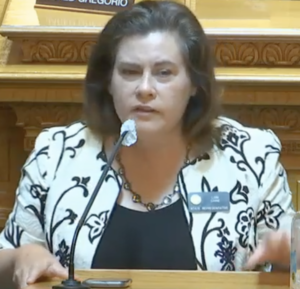
DEMOCRATS
REPUBLICANS
95%
5%

(D) J. Hickenlooper*
(R) Somebody
80%
20%


(D) M. Dougherty
(D) Jena Griswold
60%↑
40%↑


(D) Brianna Titone
(D) Jeff Bridges
(R) Kevin Grantham
40%
40%
30%

(D) Diana DeGette*
(R) Somebody
90%
2%

(D) Joe Neguse*
(R) Somebody
90%
2%

(R) Jeff Hurd*
(D) Somebody
80%
40%

(R) Lauren Boebert*
(D) Somebody
90%
10%

(R) Jeff Crank*
(D) Somebody
80%
20%

(D) Jason Crow*
(R) Somebody
90%
10%

(D) B. Pettersen*
(R) Somebody
90%
10%

(R) Gabe Evans*
(D) Manny Rutinel
(D) Yadira Caraveo
45%↓
40%↑
30%

DEMOCRATS
REPUBLICANS
80%
20%

DEMOCRATS
REPUBLICANS
95%
5%

(D) J. Hickenlooper*
(R) Somebody
80%
20%


(D) M. Dougherty
(D) Jena Griswold
60%↑
40%↑


(D) Brianna Titone
(D) Jeff Bridges
(R) Kevin Grantham
40%
40%
30%

(D) Diana DeGette*
(R) Somebody
90%
2%

(D) Joe Neguse*
(R) Somebody
90%
2%

(R) Jeff Hurd*
(D) Somebody
80%
40%

(R) Lauren Boebert*
(D) Somebody
90%
10%

(R) Jeff Crank*
(D) Somebody
80%
20%

(D) Jason Crow*
(R) Somebody
90%
10%

(D) B. Pettersen*
(R) Somebody
90%
10%

(R) Gabe Evans*
(D) Manny Rutinel
(D) Yadira Caraveo
45%↓
40%↑
30%

DEMOCRATS
REPUBLICANS
80%
20%

DEMOCRATS
REPUBLICANS
95%
5%
 June 11, 2020 01:12 PM UTC
June 11, 2020 01:12 PM UTC 25 Comments
25 Comments
Sadly, she thinks she's being smart. Bless her heart.
I am reminded of the Jim Belushi speech in Animal House. " Was it over when the Germans bombed Pearl Harbor ? " " HELL NO ! "
At least Belushi was inspirational. Plus, he was on a roll. Lori is on a . . . ?
different planet ? tangential pencil rant ? The possibilities are endless
What term limits gives us.
Thankfully, she's termed out this year.
Not so quick.
Saine is running for Weld Co Commissioner
Weld Co Commissioner Barbara Kirkmeyer is running for Vicki Marble's Senate seat
Vicki Marble is running for Perry Buck's house seat.
The torture never stops
– Frank Zappa
Funny how all these anti-gubmint types spend their lives sucking on the public teat
Unfortunately, the Republicans who are vying for her spot are little carbon copies. They kowtow to the oil and gas companies while crapping on the actual workers. They claim taxes are evil, yet they complain about our schools. The are all anti-women’s right…to the point that one of them doesn’t even think women should wear pants! We need to do what we can to support the Democratic candidate that is running for her seat. I know there is a Democrat that is running against her for the county commissioner seat, too.
Fortunately I was not there to listen to this particular inSaine lesson . . .
. . . had I been, I probably would have used my invisible hand to jam a fistful of sharpened Atlas No. 2 pencils, which no one person could ever know how to make, into my ear drums. Repeatedly. . . .
Can someone check if Michael Bowman is in the house? He speaks fluent Northeast Coloradan and perhaps he can translate.
He may be busy hand forging a plow on an anvil in his garage, pausing occasionally to squirt milk from an udder into a rough-hewn cup. Because all NE Coloradans roll that way. Not.
Did #WhiteProsperityJesus and Adam Smith get married and not tell anyone???
Он продолжает перенаправлять меня на эту интернет-ссылку:?
I’ve read this twice now CHB and I really don’t know what to say, other than as long as there is a demand for pencils there will be some old white evangelical who will find a sweatshop somewhere and liberate a bunch of poor folk while reading verses from the prosperity gospel.
As for milk, I milk my oats and almonds these days.
I think the good lady needs to worry a lot less about knowing how to make a pencil and concentrate on how the next generation is going to compete in the digital world. Hint, Lori: they won’t need pencils. Or whale blubber to burn in their kerosene lamps. Or salt to keep their meat from spoiling.
And they won't try to mix guns and airports either.
Who's obsessed with who?
(. . . whom, ya’ nutlid)
Giddyup . . .
“Who’s obsessed with who?”
Is that a reference to “Who Made Who,” by AC/DC? Or “Who Are You?” by The Who?
Sorry Banger,
Nutlid isn't cool enough to get those references.
I was thinking the Adolescents' "Who is Who". https://www.youtube.com/watch?v=LEJNxmuCGN4
Give it up, Fluffs. You need to pick a new champion. Corey is going down with the Orange Destruction. TC is looking for people.
It's that time in the election cycle when Moddy needs to start wearing a helmet. He just can't resist the #NutterBait.
Whom, Moddy. Who is obsessed with whom?
it is a peculiar interpretation of Henry Ford’s genius to suggest “Henry Ford developed this concept where one person could do one thing in excellence. And then the next person does the next thing in excellence.” “Excellence” is not required on a production line — consistency and efficiency is what Ford was after.
When I was teaching speech, there were many reasons I urged my students to talk about what they already knew and cared about, to research to find the facts and opinions to confirm their opinion, and to think hard about who they would be talking with and what might help to inform or persuade them. Speaking extemporaneously is difficult — and this would have been an excellent example of what can go wrong.